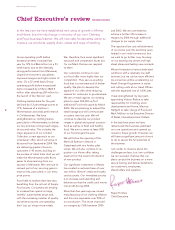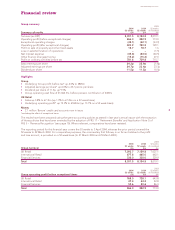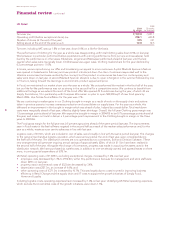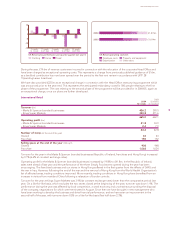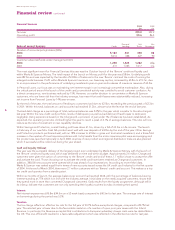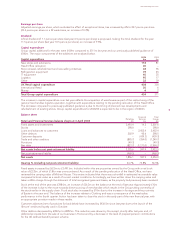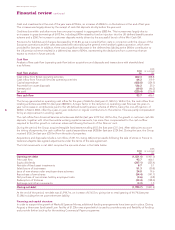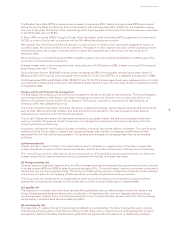Marks and Spencer 2004 Annual Report Download - page 14
Download and view the complete annual report
Please find page 14 of the 2004 Marks and Spencer annual report below. You can navigate through the pages in the report by either clicking on the pages listed below, or by using the keyword search tool below to find specific information within the annual report.
12
Marks and Spencer Group plc
Corporate governance
The Board is committed to high standards of corporate
governance and supports the new Combined Code on
Corporate Governance (the ‘Code’), published in July 2003,
which takes effect for Marks & Spencer from 4 April 2004.
The following statement is intended to explain our
governance policies and practices in light of the new Code
principles and provisions and to provide insight into how
the Board and management run the business for the benefit
of shareholders. A detailed account of how we will comply
with the new Code provisions can be found on the Corporate
Governance section of the Company’s website, together with
the terms of reference of the audit, remuneration and
nomination committees, at www.marksandspencer.com.
The Board
At 24 May 2004, the Board comprised the Chairman, Chief
Executive, five executive directors and five non-executive
directors, who are collectively responsible for the success
of the Company. A list of directors, with details of their
biographies and committee membership, is given on page 18
of the Annual Review.
Luc Vandevelde is Chairman and his prime responsibility
is for the working of the Board, for the balance of its
membership subject to Board and shareholder approval,
and for ensuring that all directors are able to play their full
part in its activities.
Roger Holmes is Chief Executive and he is responsible
for all aspects of the management of the Group and its
business, which includes developing the appropriate
business strategy for Board approval and securing its timely
and effective implementation.
The Chairman ensures that the directors receive accurate,
timely and clear information. Directors are encouraged to
update their skills, knowledge and familiarity with the Group
through their initial induction, ongoing participation at
Board and committee meetings, and through meeting our
people at Head Office and store locations. The Board is
regularly updated on governance and regulatory matters.
Coaching is also available to directors to develop individual
skills as required. There is an established procedure
whereby any director, wishing to do so in the furtherance of
his or her duties, may take independent professional advice
through the Group Secretary at the Company’s expense.
This has been extended to the audit, remuneration and
nomination committees.
Brian Baldock is Senior Independent Director and his prime
responsibility is to provide a communication channel
between the Chairman and the non-executive directors and
to ensure that the views of each non-executive director are
given due consideration. He is also an additional contact
point for shareholders if they have reason for concern which
contact through the normal channels of Chairman, Chief
Executive or Chief Financial Officer has failed to resolve or
for which contact is inappropriate.
The non-executive directors provide a wide range of skills
and experience to the Group. They bring an independent
judgement on issues of strategy, performance, risk and
people through their contribution at Board and committee
meetings. The Board considers that each non-executive
director is independent in character and judgement and that
they also meet the independence criteria set out in the Code.
It is currently anticipated that up to three new non-executive
directors will be joining the Board in the next 12 months.
The first such appointment will re-establish the balance
between executive and non-executive directors. Subsequent
appointments will lead to first Brian Baldock and then Dame
Stella Rimington retiring from the Board, both having served
in excess of six years as non-executive directors. This
recruitment plan has been agreed by the Board, on the
recommendation of the nomination committee, to manage
the orderly succession of non-executive directors without
compromising Board or committee effectiveness.
Graham Oakley is Group Secretary and Head of Corporate
Governance. He acts as a confidential sounding board to
the Chairman and individual directors, assisting with their
induction, duties and departure. He plays a key role for the
Chairman in ensuring the effective functioning of the Board
and its committees and that procedures are both followed
and regularly reviewed. He also leads the Corporate
Governance Group, which provides advice, guidance and
support to the Board and its committees and to commercial
colleagues on a wide range of governance issues.
The Board has a formal schedule of matters reserved for its
decision. It determines the overall Group strategy; creation,
acquisition or disposal of material corporate entities or
assets; development and protection of the brand; matters
of public interest that could affect the Group’s reputation;
public announcements including statutory accounts;
significant changes in accounting policy; capital structure
and dividend policy; operating plans and key performance
indicators; prosecution, defence or settlement of material
litigation; Group remuneration policy; Board structure,
composition and succession.
In January 2004, a new executive committee was created to
streamline top decision-making which comprises the Chief
Executive, executive directors, Group Secretary and
directors of IT, HR and Marketing. It manages the overall
performance of the Group, principally through the setting of
clear objectives and effective performance coaching,
building long-term management capability, and ensuring
that the business is managed in a fit and proper manner in
keeping with the values and business principles.
Under the Company’s Articles of Association, all directors
seek election at their first AGM and all directors are required
to offer themselves for re-election at least every three years.
In addition, any director who is aged 70 or more is required
to retire and seek re-election annually.


